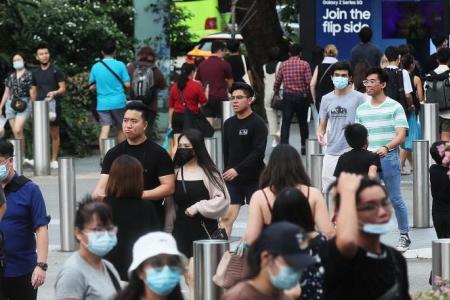Singapore Covid-19 cases dip as WHO notes higher reinfection risk of BQ.1 variant
Singapore’s Covid-19 case counts are on a downward trend, with the seven day moving average peaking on Oct 18 at 8,243 cases. As of Oct 28, the number has dropped significantly to 5,193.
The week on week infection ratio – which refers to the ratio of community cases for the past week, over the week before – hit a high of 1.74 on Oct 9 and has since fallen as well.
This comes a week after Health Minister Ong Ye Kung mentioned that the ongoing wave of Covid-19 infections driven by the XBB subvariant may peak earlier than mid-November.
Professor Dale Fisher, senior consultant at the National University Hospital’s Division of Infectious Diseases, said on Sunday that there are indications that this surge in cases has peaked.
“What we see as most important - our hospital admissions, those requiring oxygen and those in intensive care unit... with these numbers now all trending down, it does look like we may have some relief on our doorstep,” he said.
There were 463 patients in hospitals (general ward) as of Oct 29, down from a high of close to 600 about 10 days ago.
With new variants still emerging worldwide, these numbers will continue to fluctuate, Prof Fisher noted. “But hopefully we will see less of these high levels that potentially impact hospital activity,” he added.
In an update on Oct 27 on the XBB variant, the World Health Organisation (WHO) said that while further studies are needed, current data do not suggest there are substantial differences in disease severity for XBB infections. There is, however, early evidence pointing to a higher reinfection risk, compared to other circulating Omicron sub-lineages. The XBB strain is another Omicron subvariant.
The WHO added that whether the increased immune escape of XBB is sufficient to drive new infection waves will depend on factors such as the size and timing of previous Omicron waves, as well as the level of Covid-19 vaccination coverage in each country.
In an update on the new variants that have also been detected in Singapore, namely the BQ.1 variant, the WHO noted that the BQ.1 is showing a significant growth advantage over other circulating Omicron sub-lineages in many settings, including Europe and the United States, and therefore warrants close monitoring.
However, there is no data on severity or immune escape from studies on humans.
Four Covid-19 cases infected with the BQ.1 and BQ.1.1 variants have been detected in Singapore as at Oct 23. The BQ.1 and BQ.1.1 subvariants are sub-lineages of the Omicron variant BA.5. The strains have since been detected in more than 50 countries. BQ.1.1 has one mutation more than BQ.1, which itself is a few mutations away from BA.5.2.
“It is likely that these additional mutations have conferred an immune escape advantage (for the BQ.1 variant) over other circulating Omicron sub-lineages, and therefore a higher reinfection risk is a possibility that needs further investigation. At this time there is no epidemiologic data to suggest an increase in disease severity,” said the WHO.
Get The New Paper on your phone with the free TNP app. Download from the Apple App Store or Google Play Store now


